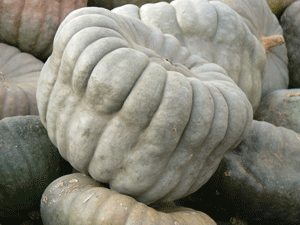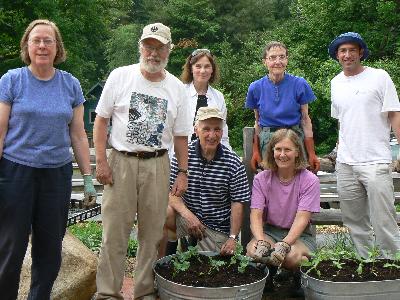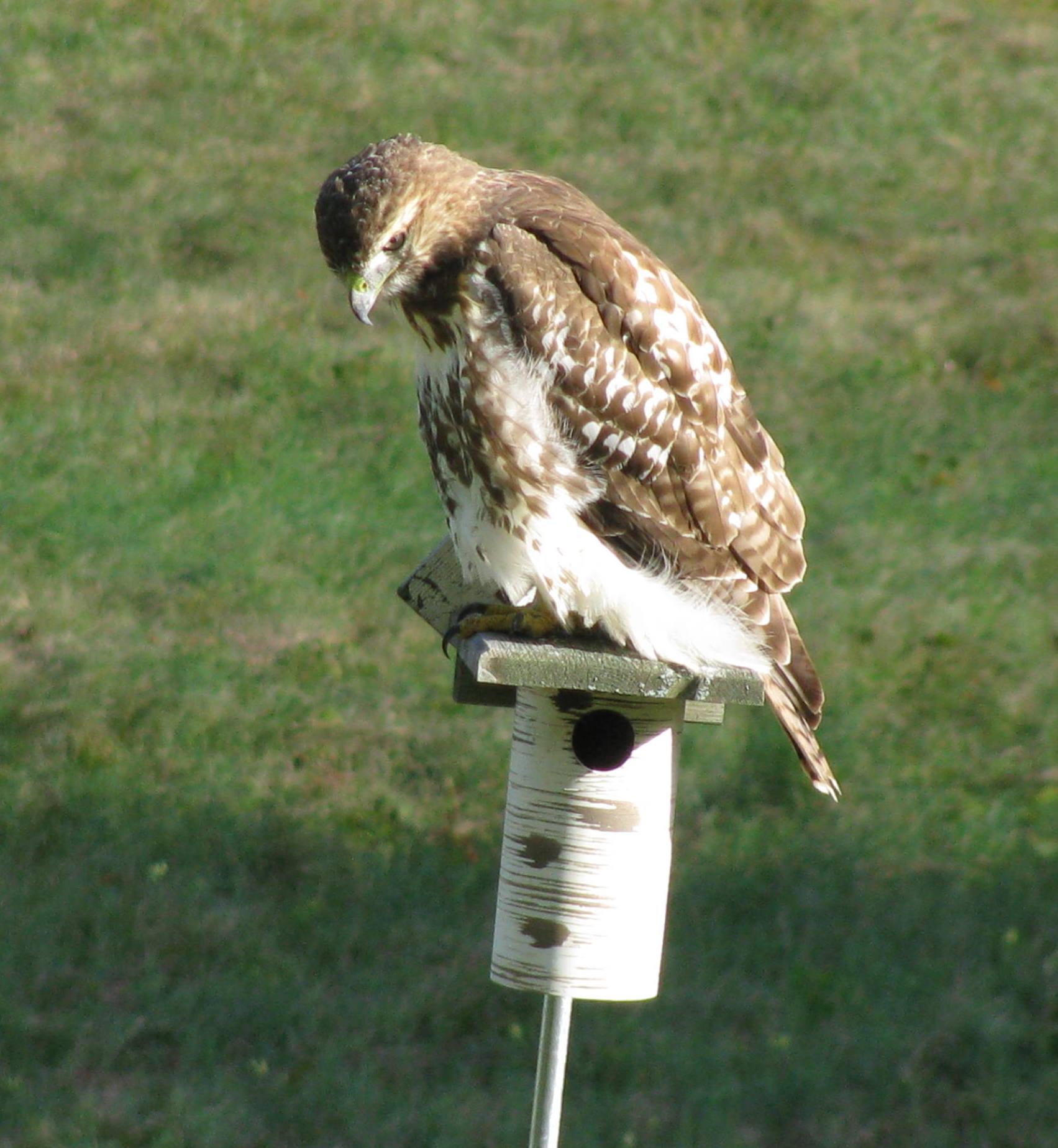|
|
 |
|
SPECIAL EVENTS
Drumlin Farm Community Preschool Open House
Saturday, January 8
10:00 am-noon
Stew and Brew
Age 21+
Friday, February 4
6:30 pm
|
 |
|
HOW YOU CAN HELP
The Drumlin Farm staff wishes to extend their appreciation to the more than 1,000 volunteers who donated their time to our sanctuary in 2010. Corporate, high school, and college volunteer groups, along with many individuals, contributed over 15,000 hours. Special thanks to our “regular” volunteers who help out every week – what a difference you make!
If you are interested in volunteering, please contact Pam Sowizral at 781-259-2205, or e-mail her.
Wild About Wildlife?
Support their care by becoming an Animal Angel.
|
|
 |
|
ETCETERA...
Hungry for more of the dish on Drumlin Farm?


|
 |
|
GREEN TIP: REDUCE YOUR CARBON FOOTPRINT
|
|
 Green Holiday Giving Green Holiday Giving
Go green for your holiday gifts! Consider a Mass Audubon gift membership or a Mass Audubon gift card, available in any denomination (between $1 and $500) at the Drumlin Farm admission window. Gift cards can be used toward program fees, camp tuition, gift shop purchases—any kind of purchase at all Mass Audubon sanctuaries!
|
|
 |
| MEMBERSHIP |
|

|
|
|
|
|
Welcome Friend!
|
December 2010
|
Drumlin Farm Tails is a free monthly newsletter from your friends at Drumlin Farm Wildlife Sanctuary.
|
|
WALLPAPER OF THE MONTH
|
|


|

Fall's Harvest Enjoyed the Whole Winter Through
Farm fresh vegetables are the hallmark of only the summer months, or are they? If you learn how to store them right, you can enjoy farm fresh produce year-round. At Drumlin Farm we have a root cellar to store the many hundreds of pounds of vegetables grown for the participants in our winter CSA, but it's possible to simulate the conditions of the root cellar in your own home as well.
 The key to a successful root cellar or home store experiment is darkness, temperature, and humidity. In the Drumlin Farm root cellar, we monitor the temperature inside the cellar and outside. A fan is used to blow cool air into the cellar when the temperature outside is lower than the inside temperature. The key to a successful root cellar or home store experiment is darkness, temperature, and humidity. In the Drumlin Farm root cellar, we monitor the temperature inside the cellar and outside. A fan is used to blow cool air into the cellar when the temperature outside is lower than the inside temperature.
At home you can keep your vegetables away from heat sources and in the coolest (and darkest part of your house). Monitor your vegetables and make sure to use anything that's sprouted as soon as you notice; once produce starts to feel mushy, it's rotten. Larger vegetables also tend to go bad faster than the smaller ones, so use those first. If you are looking to store large quantities of vegetables, you could even consider constructing your own root cellar. To learn more about how Drumlin Farm stores our winter veggies check out this article that appeared last year in Edible Boston.
We Steward the Land, But Who Stewards Us?
Drumlin Farm is fortunate to benefit from the hard work of many, many volunteers. Some of our most dedicated volunteers are the nearly twenty members of our Sanctuary Committee. These individuals volunteer their time on an advisory board for Drumlin Farm. Each year the Sanctuary Committee also puts on the very popular Sap to Syrup Farmer's Breakfast, which raises a sizable amount of money for Drumlin Farm. They are also responsible for the beautiful planters that appear each spring in the welcome area.
In the past year, they've committed themselves to a new ongoing project, the restoration of the vernal pool. If you have visited recently, you've likely seen the black plastic on the ground around the pool across from Bird Hill. The temporary plastic is used to prevent invasives from getting sun needed to thrive. This is part of an experiment to see if plastic controls the invasives in the area better than constant mowing (taking place in the area directly adjacent). We'll let you know what the verdict is!

Wildlife and Livestock Coexisting, Sometimes Not So Peacefully
While staff and visitors have enjoyed seeing the juvenile hawk that has been frequenting the sanctuary, it has also become a lesson on the predator and prey relationship as a part of the farm/nature connection. Visit the Living With Wildlife page to learn more about red-tailed hawks.

This hawk has visited the eggmobile on a couple of occasions, and can often be seen observing the chickens (perched on top of the Red Barn, or in a tree at the edge of the pasture). The chickens have learned to take refuge inside their coop, or beneath it, and netting will be going up shortly to prevent the hawk from further visits.
One of the main effects of predators on the chickens is stress, which causes them to slow or stop their egg production. You can learn more about protecting chickens from predators in our spring Backyard Chickens class.
Watch for the new Drumlin Farm Program Brochure
 The winter program brochure is nearly ready to go. If you don't get our program brochure but would like to please e-mail us, and we'll make sure you get a copy. All of our programs are also listed in our online program catalog. The winter program brochure is nearly ready to go. If you don't get our program brochure but would like to please e-mail us, and we'll make sure you get a copy. All of our programs are also listed in our online program catalog.
|

 Drumlin Farm Wildlife Sanctuary
Drumlin Farm Wildlife Sanctuary



 The key to a successful root cellar or home store experiment is darkness, temperature, and humidity. In the Drumlin Farm root cellar, we monitor the temperature inside the cellar and outside. A fan is used to blow cool air into the cellar when the temperature outside is lower than the inside temperature.
The key to a successful root cellar or home store experiment is darkness, temperature, and humidity. In the Drumlin Farm root cellar, we monitor the temperature inside the cellar and outside. A fan is used to blow cool air into the cellar when the temperature outside is lower than the inside temperature. 

 The winter program brochure is nearly ready to go. If you don't get our program brochure but would like to please
The winter program brochure is nearly ready to go. If you don't get our program brochure but would like to please